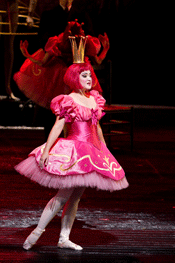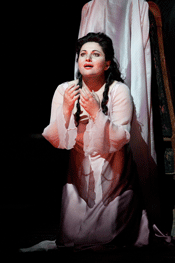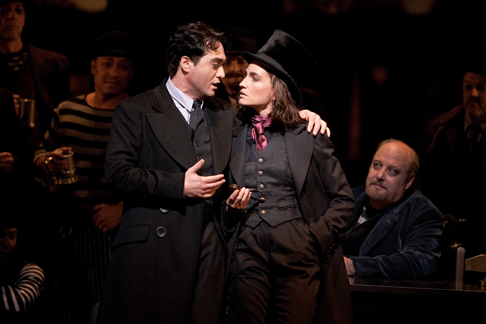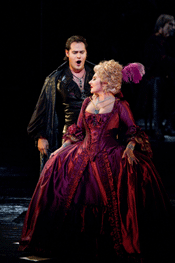![Giuseppe Filianoti as Hoffmann [Photo by Marty Sohl courtesy of Metropolitan Opera]](http://www.operatoday.com/HOFFMANN_Filianoti.gif)
28 Oct 2010
Kafka at the Opera: Bartlett Sher’s Production of Hoffmann at the Met
We all come to the opera for different things. To escape, to elevate, to laugh, to cry, or perhaps because someone else bought the tickets.
English Touring Opera are delighted to announce a season of lyric monodramas to tour nationally from October to December. The season features music for solo singer and piano by Argento, Britten, Tippett and Shostakovich with a bold and inventive approach to making opera during social distancing.
This tenth of ten Live from London concerts was in fact a recorded live performance from California. It was no less enjoyable for that, and it was also uplifting to learn that this wasn’t in fact the ‘last’ LfL event that we will be able to enjoy, courtesy of VOCES8 and their fellow vocal ensembles (more below …).
Ever since Wigmore Hall announced their superb series of autumn concerts, all streamed live and available free of charge, I’d been looking forward to this song recital by Ian Bostridge and Imogen Cooper.
Although Stile Antico’s programme article for their Live from London recital introduced their selection from the many treasures of the English Renaissance in the context of the theological debates and upheavals of the Tudor and Elizabethan years, their performance was more evocative of private chamber music than of public liturgy.
Evidently, face masks don’t stifle appreciative “Bravo!”s. And, reducing audience numbers doesn’t lower the volume of such acclamations. For, the audience at Wigmore Hall gave soprano Elizabeth Llewellyn and pianist Simon Lepper a greatly deserved warm reception and hearty response following this lunchtime recital of late-Romantic song.
For this week’s Live from London vocal recital we moved from the home of VOCES8, St Anne and St Agnes in the City of London, to Kings Place, where The Sixteen - who have been associate artists at the venue for some time - presented a programme of music and words bound together by the theme of ‘reflection’.
'Such is your divine Disposation that both you excellently understand, and royally entertaine the Exercise of Musicke.’
‘And there was war in heaven: Michael and his angels fought against the dragon; and the dragon fought and his angels, And prevailed not; neither was their place found any more in heaven … that old serpent … Satan, which deceiveth the whole world: he was cast out into the earth, and his angels were cast out with him.’
There was never any doubt that the fifth of the twelve Met Stars Live in Concert broadcasts was going to be a palpably intense and vivid event, as well as a musically stunning and theatrically enervating experience.
‘Love’ was the theme for this Live from London performance by Apollo5. Given the complexity and diversity of that human emotion, and Apollo5’s reputation for versatility and diverse repertoire, ranging from Renaissance choral music to jazz, from contemporary classical works to popular song, it was no surprise that their programme spanned 500 years and several musical styles.
The Academy of St Martin in the Fields have titled their autumn series of eight concerts - which are taking place at 5pm and 7.30pm on two Saturdays each month at their home venue in Trafalgar Square, and being filmed for streaming the following Thursday - ‘re:connect’.
The London Symphony Orchestra opened their Autumn 2020 season with a homage to Oliver Knussen, who died at the age of 66 in July 2018. The programme traced a national musical lineage through the twentieth century, from Britten to Knussen, on to Mark-Anthony Turnage, and entwining the LSO and Rattle too.
With the Live from London digital vocal festival entering the second half of the series, the festival’s host, VOCES8, returned to their home at St Annes and St Agnes in the City of London to present a sequence of ‘Choral Dances’ - vocal music inspired by dance, embracing diverse genres from the Renaissance madrigal to swing jazz.
Just a few unison string wriggles from the opening of Mozart’s overture to Le nozze di Figaro are enough to make any opera-lover perch on the edge of their seat, in excited anticipation of the drama in music to come, so there could be no other curtain-raiser for this Gala Concert at the Royal Opera House, the latest instalment from ‘their House’ to ‘our houses’.
"Before the ending of the day, creator of all things, we pray that, with your accustomed mercy, you may watch over us."
The doors at The Metropolitan Opera will not open to live audiences until 2021 at the earliest, and the likelihood of normal operatic life resuming in cities around the world looks but a distant dream at present. But, while we may not be invited from our homes into the opera house for some time yet, with its free daily screenings of past productions and its pay-per-view Met Stars Live in Concert series, the Met continues to bring opera into our homes.
Music-making at this year’s Grange Festival Opera may have fallen silent in June and July, but the country house and extensive grounds of The Grange provided an ideal setting for a weekend of twelve specially conceived ‘promenade’ performances encompassing music and dance.
There’s a “slide of harmony” and “all the bones leave your body at that moment and you collapse to the floor, it’s so extraordinary.”
“Music for a while, shall all your cares beguile.”
The hum of bees rising from myriad scented blooms; gentle strains of birdsong; the cheerful chatter of picnickers beside a still lake; decorous thwacks of leather on willow; song and music floating through the warm evening air.
![Giuseppe Filianoti as Hoffmann [Photo by Marty Sohl courtesy of Metropolitan Opera]](http://www.operatoday.com/HOFFMANN_Filianoti.gif)
We all come to the opera for different things. To escape, to elevate, to laugh, to cry, or perhaps because someone else bought the tickets.
But, considering the number of people involved — hundreds of artists and craftsmen onstage and off as well as thousands in the audience at each performance — it is impossible for a production in a large house to fulfill all of the expectations that rise up inside of us the Metropolitan Opera’s signature chandeliers. What is the mark of a good production, especially in a large house? On the one hand, opera involves the energies and resources of many people and, therefore, the hope is that this investment of talent and money will pay off over the course of many seasons despite both rotating casts and changing tastes. However, the thrill of any live performance is its singularity. Part of the allure and, indeed, the satisfaction of seeing an opera (even now in the era of the simulcast) is the ability to stand witness and say “I was there when...” Good directors recognize the challenge of building a show that can stand the test of time but also showcase the particular talents at any given performance.
 Anna Christy as Olympia
Anna Christy as Olympia
In the instance of the Metropolitan Opera’s recent production of
Offenbach’s Les Contes d’Hoffmann (seen here on October
12, 2010), directed by Bartlett Sher, the premiere performances in the winter
of 2009 were disappointing compared to Sher’s invigorated Il Barbiere
di Siviglia (also for the Met) and his stunning Lincoln Center production
of South Pacific. With a few exceptions, the cast seemed to be square
pegs in Sher’s Kafka-shaped holes. Typically compelling performers seemed
unmoored among the shows many disparate cultural allusions. Joseph Calleja, who
stepped into the title role on relatively short notice, and Anna Netrebko (as
both Stella and Antonia) seemed most at sea. Without a surer sense of the
opera’s protagonist and the framing device of his love for the diva
Stella, the opera quickly descended towards pastiche.
 Hibla Gerzmava as Antonia
Hibla Gerzmava as Antonia
A second viewing this season, however, showed Sher’s adaptation in a
much more flattering light. Moments that previously fell flat sparkled and,
while the Kafka parallel still seems arbitrary at times, the interpretive
choices gave a challenging work some new pizzazz. Given the constants of the
production, it is reasonable to conclude that the new energy in his
Hoffmann came from the evening’s individual performances. In the
title role, Giuseppe Filianoti was both sympathetic and impish, showing
heartache through humor in the tradition of Charlie Chaplin. During the tavern
scene at Luther’s, the tenor carried himself with the energy of a man
itching for a fight — even if happens to be with his best friend. The
role is vocally demanding as well as a dramatic challenge and Filianoti sang
with definite style, if not always ease, throughout the entire evening. He and
Hibla Gerzmava made thrilling sounds together and were as appealing visually as
they were aurally. Gerzmava lacked some of the character definition desired for
Stella, but definitely rose to the occasion as Antonia. Thanks in large part to
her gracious singing and acting, Act II could have been performed as a
satisfying dramatic event on its own.
As in the premiere performances, Kate Lindsey epitomized mystique in the dual role of the Muse and Nicklausse. She sings and moves with an energy appropriate for a large house while maintaining a sense of realism in her acting that feels intimate. Occasionally overpowered by the orchestra, Lindsey is a singer with great dramatic and musical finesse. As an actress, the role suits her perfectly and, with the exception of a few vocal distractions, it is easy to slip into believing she is the Muse.
 Giuseppe Filianoti in the title role and Kate Lindsey as Nicklausse
Giuseppe Filianoti in the title role and Kate Lindsey as Nicklausse
Both Elena Mosuc and Enkelejda Shkosa, who sang Olympia and Giulietta, are Met debutantes this season. Of the two, Shkosa made the stronger first impression. As the luscious but avaricious courtesan, she exhibited a wealth of vocal riches as well as a real sense of comedy. Her voice has substance as well as style and her aria was rich and creamy enough to pass as the evening’s dessert. In contrast, Mosuc’s turn as Olympia fell flat. As hard as it must be to play an amusing and engaging automaton, both Kathleen Kim and Rachele Gilmore proved in their performances of this production last year that it can indeed be done.
Ildar Abdrazakov relished the wickedness of the four villains and his performance included several impressive evil laughs. Joel Sorenson performed all four servants with aplomb but his Frantz was particularly notable for being both musically satisfying and genuinely funny.
 Ildar Abdrazakov as Dapertutto and Enkelejda Shkosa as Giuletta
Ildar Abdrazakov as Dapertutto and Enkelejda Shkosa as Giuletta
Of the evening’s debuts, perhaps the most significant was that of
conductor Patrick Fournillier. With only a few exceptions, his tempi moved
briskly enough to keep the action going without becoming frenetic. The chorus
was well-prepared musically by Donald Palumbo, but they were disappointingly
generic for a large group dressed up as circus freaks and students, especially
when compared to the remarkably specific performances Sher evinced from his
actors in South Pacific.
The sets by Michael Yeargan effectively represented a sort of theatre of the mind. Costumes by Catherine Zuber included a few especially titillating supernumeraries and dancers, but also included an awkward ensemble for Antonia’s mother (more than capably sung by Wendy White). Duane Schuler’s lighting did much to evoke mood and smooth over transitions, but it would have been interesting to see both the lighting and minimal projections used to further the reference to Federico Fellini that Sher mentions in his director’s notes. In fact, with his idiosyncratic, fantastic style and his penchant for both autobiographic material and female muses, the Italian director seems a more direct parallel to the character Hoffmann than does the enigmatic outsider Franz Kafka. Even with the newly energized performances, this production of Hoffmann may grow old quickly, especially for those with the ability to see beauty as Kafka described it.
Alison Moritz